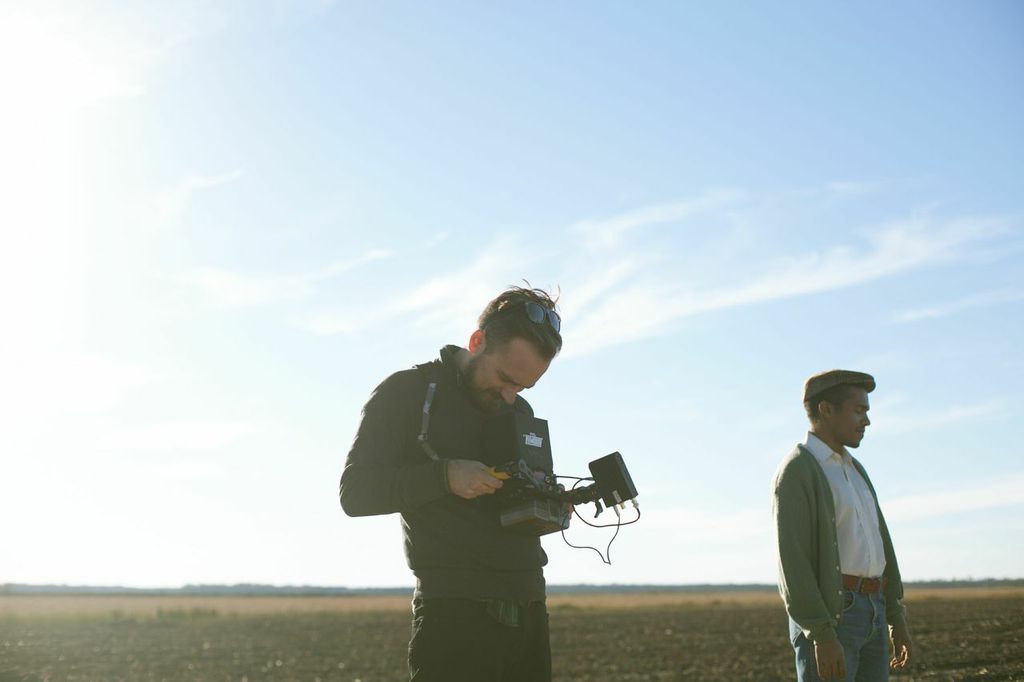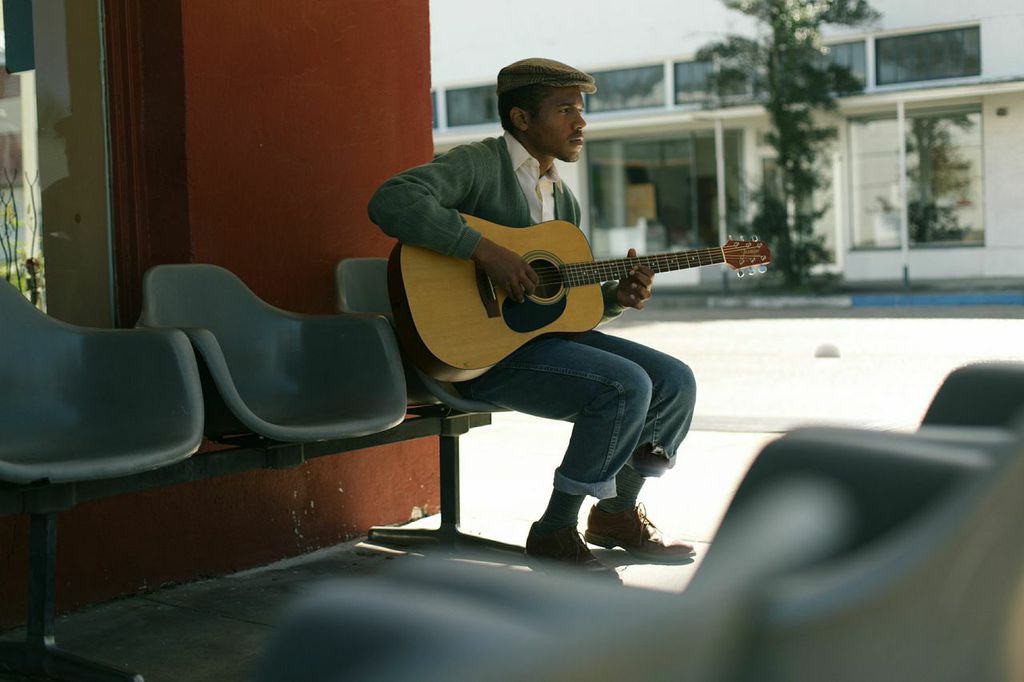One form of short film that never quite earns the respect it
deserves is the music video. Many view the music video format as a time-waster,
an art form that serves mainly as a marketing tool for the band/singer rather
than a piece of cinema worthy of discussion or debate. To be fair, most music
videos do have a throw-away, frivolous quality to them, but when a director
aims to create something more artful and cinematic, it often gets lost in the
constant barrage of performance-based music videos that exist solely to
exemplify an artist’s persona.
But the long-form music video often showcases a band or
artist with high ambitions, often giving the songs more weight and clarity. In
the case of “The Future is Slow Coming”—a long-form music video
consisting of two songs by Benjamin Booker—it tells a straightforward
narrative that brilliantly serves the complexity of the lyrics and the
emotional drive of the music. Benjamin Booker, currently a rising star in the
music world, creates songs that combine blues with raw, garage rock intensity
and with a vocal delivery that sounds ferocious and uninhibited.
Booker also stars in the film, naturally, but takes on the
role of a musician travelling through the Deep South in the ’60s. For the first
half (“Slow Coming”), Booker drives up to a crossroads with no
apparent destination. He takes a turn and on his way to a small, rural town, he
comes across a grave post. When he arrives in town, he eats at Edna’s Diner and
notices the deep racial tension between the citizens and cops in this town. He
goes back to the crossroads, takes a different path and comes across the same
grave post, the same diner and the same problems. This keeps happening and only
when Booker gets out of the car to confront the police does the story take a
turn.
The second half of the film (“Wicked Waters”)
explodes with energy when Booker finds refuge and an exhilarating musical
release. Here, the film could have switched over into performance mode, but
director James Lees wisely sticks to the story and takes the film to a
satisfyingly ambiguous conclusion. Lees and Booker are also careful not to
spell out any parallels between the actions of the segregated Deep South and
the current situations in Ferguson. The imagery itself has enough power to both
recall the past and underscore the present as Booker sings, “The future is
slow, slow coming.”
Period pieces shot on digital video and with a limited
budget can be hard to pull off in trying to evoke realism, but Lees and his
crew have done a masterful job of selling the time period. Cinematographer
Jackson Hunt avoids obvious magic hour shots and instead keeps things gritty,
focusing more on the urgency of the situation. Michael Carter’s editing has a
smoothness to it that makes it feel more like a film and less like a music
video.
And then there’s Booker himself. Many musicians do their
best to try and “act” in their music video and one often gets the
sense that they’re uncomfortable doing just that. But Booker has a commanding
presence and does a fine job of carrying the film. But obviously, it’s his
music and vocal delivery that commands the most attention. Musicians have it
rough today in trying to get their music into the right hands and to try and
gain an audience. Every month, there comes a flood of indie bands and singers
trying to get attention from the music-savvy, record store-hopping music lovers
on the lookout for something new and exciting. “The Future is Slow
Coming” is a film that stands on its own as a short, signifies the arrival
of a major musical talent and serves as a reminder that smart music video
filmmaking is alive and well.

How did
this long-form video come about? Did you have the idea or did Benjamin?
JAMES LEES: Ben’s
record label wanted two videos made, one for each of his next two singles, and
they sent out a fairly open brief to directors. In my opinion Benjamin’s album
was one of the standout albums of the year and his music has such genuine
meaning and emotion I knew I had to make these videos. I wrote the story
drawing upon things Benjamin specifically sings about in the songs and ideas I
am developing for a feature. I then told Ben and the label that I wanted to
make a narrative that was spread across two parts, each song soundtracking one
half of the story, so it had to be both videos or nothing. Luckily, they were
as excited by the project as I was and got fully behind it.
What was the
biggest challenge in recreating this time period?
I’d
definitely say trying to do it on the small budget we were working with. We
shot down in Louisiana where I luckily have the most incredible team who worked
complete miracles, as they do every time. Finding the right locations was
tough, we needed whole streets to look authentically early 1960’s without any
tell tale signs of modernity and when you don’t have a budget that can be very
hard! But as you can see in the film, Louisiana offered up some perfect examples
of towns and diners frozen in time.
With the
actions that take place here, one could easily draw a parallel to what has been
going on in Ferguson. Was that the intention?
Ferguson
and recent events such as the tragic deaths of Eric Garner and Tamir Rice were
a direct influence on wanting to make this film. Many of the protests now
synonymous with Ferguson are used throughout the film to make the direct link
between the past and the present. As a society, we are caught in this endless
loop of violence and tragedy, repeating the mistakes of our past and not
fulfilling the potential of our future.

I feel like
most directors would have cut the film off when Benjamin finds refuge in the
club and starts playing as though his life depends on it. But this video ends
on a more ambiguous note. Can you elaborate on that?
As the
story is based on the concept of a constant loop, I wanted to ensure the end of
the video did not have traditional closure. There are no easy answers and
currently no solution to the problem has been found, so the end of the film had
to be equally ambiguous. We actually see the black car that confronts Benjamin
in the final scene several times throughout the film and it draws on mythology
from local Louisiana Voodoo and the Delta Blues players, someone or something
potentially controlling and influencing things in both life and death.
How has the
role of the music video in an artist’s career changed over the last
decade? Has the way in which people receive music (iTunes, Spotify, Youtube, etc) changed the way in which music videos are produced?
I think
music videos have gone through a complete reinvention, although they are not available
on TV as much as they used to be they now find a much bigger audience than ever
before via online channels. It has become a hugely influential part of creating
how the public perceives an artist. People want and expect more than just the
music now and music videos are a big way for the artist to connect with their
fans and reach out to new ones. The songs, the videos, the live experience, all
have to stand out from the crowd and the right video is more important than
ever before.
What’s next
for you?
I am
very lucky to be able to keep making music videos and mix the bigger budget pop
videos with lower budget but more creatively free projects such as this. I am
also continuing to develop and work on my film career. I have always had
fantastic support from the UK film funding schemes and my fourth funded short
film, a 22 minute drama shot in Scotland about four teenagers learning to adapt
to an empty future alone, will be coming out this summer. I hope to then find
US funding for a feature I am developing that explores early 20th Century
Afro-American lives in the rural Deep South which, much like the Booker video,
combines elements of social and magical realism to tell a touching human story
that draws upon local myth and legend.
Benjamin Booker ‘The Future Is Slow Coming’ Dir: James Lees from James Lees on Vimeo.












